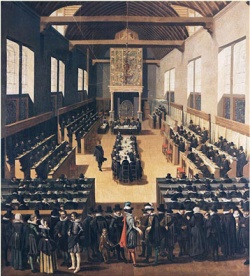The Canons of Dort, Third/Fourth Head of Doctrine, Article Three
 Thursday, January 22, 2009 at 02:54PM
Thursday, January 22, 2009 at 02:54PM  Article 3: Total Inability
Article 3: Total Inability
Therefore, all people are conceived in sin and are born children of wrath, unfit for any saving good, inclined to evil, dead in their sins, and slaves to sin; without the grace of the regenerating Holy Spirit they are neither willing nor able to return to God, to reform their distorted nature, or even to dispose themselves to such reform.
________________________________________
Whenever we address the subject of “total inability,” we need to be clear that we are speaking of but one of the major consequences of the Fall. The Bible clearly teaches that all of us are born guilty for Adam’s act of rebellion in Eden, since Adam acted for us and in our place as both the federal and biological head of human race as God’s chosen representative for humanity (cf. Romans 5:12-19). This means that because of Adam's sin, the entire human race is under the just condemnation of God, and are guilty (by imputation) for Adam’s act of rebellion from the very moment of our conception.
As we have seen throughout the prior articles, the biblical data demonstrates that we are born with what is called “original corruption.” As a consequence of Adam's fall, we are completely inclined toward all evil, we are darkened in our understanding, we are ignorant of the things of God, and separated from God from birth. We are “turned in on ourselves” and left to our own devices, we are unable to do any good (from God’s perspective) whatsoever. In fact, as the Canons point out, we are unfit "for any saving good, inclined to evil, dead in [our] sins, and slaves to sin.”
Total inability refers to the teaching that our wills are in bondage to our inherited sinful nature, as well as weakened by the darkness of our intellectual faculties. The Reformers spoke of this in terms of “the bondage of the will,” or more accurately, the “bondage of the choice.” This means that none of the fallen children of Adam are born “innocent,” nor are they “neutral” toward the things of God—as though the moral direction of each individual depends upon an act of the human will to follow either Christ’s good example, or Adam’s bad one. This is, as the Canons point out, the heresy of Pelgianism.
Instead of being innocent of guilt and neutral toward God, the Scriptures teach that we born positively hostile to God, unable, and unwilling to obey his law, unable to submit to his will, and unwilling to trust in Jesus Christ for the forgiveness of our sins. As I have pointed out, in the democratic and egalitarian context of modern America, the biblical notion of total inability makes little sense, especially given our culture’s stress upon individual freedom and the emphasis upon choice as a means of self-authentication and self-actualization. Here we have a important instance of contemporary culture influencing how we read and understand the biblical text. Americans are incurably and hopelessly Pelagian by spirit and temperament. Pelagianism is our national religion and Charles Finney our patron saint!
But the Scriptures are very clear in this regard. No one can come to Christ and believe the gospel, unless God acts upon them first, drawing them, and effectually calling them, and regenerating them, so that they come to faith in Jesus Christ! To be perfectly blunt, dead men and women are not able to resurrect themselves!
We have all heard evangelistic appeals along the lines of the gospel being God’s means of rescuing people who are drowning, or else God’s means of helping sick people recover from a fatal illness. In all of these well-intended but unbiblical appeals, the saving work of Jesus Christ actually saves no one. Rather, Jesus has provided us with what we need so that we can save ourselves, if we only we will!
In the Arminian scheme of redemption—which the Canons were written to refute—it is the sinner who must “appropriate” the work of Christ, so the work of Christ moves from the category of potentiality to actuality! In other words, the cross of Christ has the potential to save us, but the sinner must meet certain conditions such as faith and repentance for the cross to avail. This is typical of Arminianism, wherein it is argued that God’s grace is universal and non-specific. In other words, God’s prevenient grace enables all sinners to come to Christ by restoring to them “free will.” Now, even after the fall, it is argued that it is up to the drowning or dying sinner to “reach out” and take avail of the means of deliverance, or else these means remain otherwise ineffective. The sinner must grasp the life-ring before they submerge for the last time. The sinner must take the medicine that God has provided before the potentially fatal disease finally overcomes them.
This approach, which places its confidence in the ability of the members of Adam’s fallen race to save themselves—with God’s help, of course—makes perfect sense given American democratic culture, where the individual’s decision is everything. But there is not a single passage anywhere in Scripture which even hints at such a scheme.
In contrast to this Arminian notion, the doctrine of salvation as taught in Holy Scripture, is completely and totally monergistic. That is, as the Scriptures present the way in which we are redeemed from the guilt of our sins, there is but one active party who secures our salvation. There is only one party who has the power to save—this of course, is the sovereign and gracious God, not the fallen and sinful individual. This means that the analogies of drowning and sickness make no sense whatsoever according to biblical data, because it is far too late for someone to toss us a life-ring or give us a powerful medicine or wonder drug. It is too late for that. Instead of calling the paramedics, it is time to call the coroner! We are already floating face-down, lifeless in the river of Adam’s sin as well as our own.
The disease Adam has passed on to us by natural generation has already brought about its fatal consequences. Our spiritual hearts have already stopped beating and the physician has already pronounced the time of our spiritual death—the moment of conception. We don’t need a life-ring or a wonder drug. We need to be raised from the dead by a sovereign act of God! Just as our Lord stood at Lazarus’ tomb and cried out “Lazarus, come out!” so too, God must pronounce the new birth upon us through his word in the power of his Holy Spirit.
If this is true, the only conclusion we can reach is that we as the fallen children of Adam are completely unable to exercise faith in Christ—hence, total inability—and it is Jesus Christ who must come to us and act upon us while we are dead in sin, so that, we do indeed come to life. And once we have been raised from death by the power of God, we now freely and willingly trust in the saving work of Jesus Christ on our behalf, because we now for the first time we desire to do so! We now see our peril and our need of redemption—something which was oblivious to us when we were dead in sins.
As the authors of the Canons correctly point out, total inability and monergism [regeneration and effectual calling preceding faith] are necessary correlatives. We cannot come to faith in Christ because we are dead in our sins and trespasses and completely unable and unwilling to do so! But God in Christ, comes to us through the preaching of the gospel, resurrecting us from the dead and calling us to faith in his dear Son. The Canons put it this way: without the grace of the regenerating Holy Spirit they are neither willing nor able to return to God. It is God who must act upon us when we are dead in sin, if any are to be saved! We have seen that God has ordained the ends (who will be saved) as well as the means (which is the preaching of the gospel).
Now we have seen that it is God who must raise his elect from spiritual death by applying to them the saving merits of Christ so that they do in fact, believe the gospel. Apart from this act of God, we remain “totally unable.”











